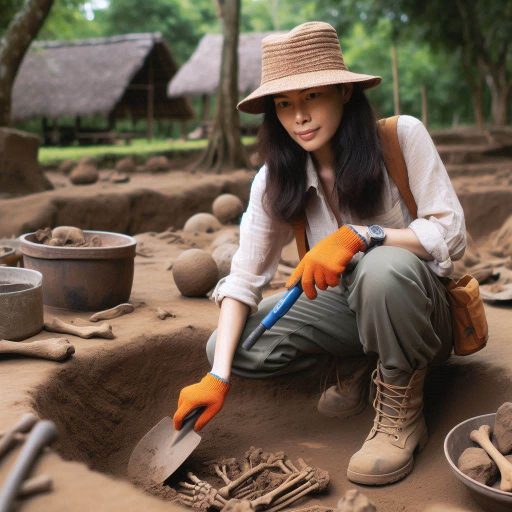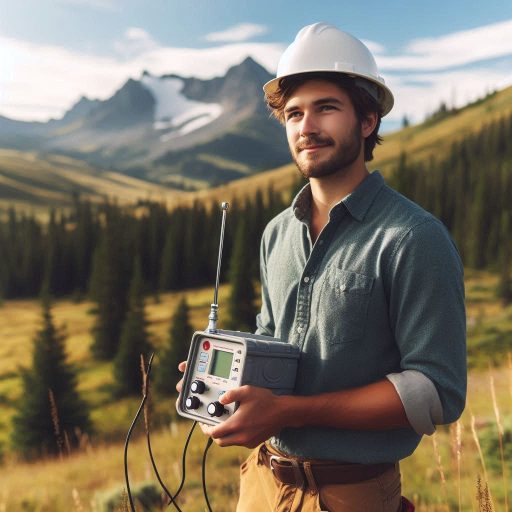Introduction
Plant science graduate programs offer students the opportunity to deepen their knowledge and skills in various areas.
These programs cover topics such as plant biology, genetics, ecology, and biotechnology.
They prepare students for careers in research, agriculture, and conservation.
Students engage in hands-on experiences, working with cutting-edge technologies and methodologies.
Successfully navigating these programs is essential for academic and professional growth.
First, understanding program requirements helps students tailor their coursework to their interests.
This focus allows them to gain expertise in specific areas of plant science.
Networking with faculty and peers opens doors to collaborative research opportunities.
Additionally, seeking internships and field experiences enhances practical knowledge.
Students who engage in real-world applications develop critical skills and increase employability.
Participating in conferences exposes students to the latest research and trends in the field.
These experiences build confidence and foster a sense of community.
Lastly, effective time management ensures that students balance coursework, research, and personal life.
By prioritizing tasks, students can meet deadlines and excel academically.
In summary, plant science graduate programs provide valuable education and training.
Successfully navigating these programs leads to rewarding careers and meaningful contributions to the field.
Researching programs
Identifying the Right Programs for Your Interests
Start by clarifying your specific interests within plant science.
Are you drawn to plant genetics, ecology, or agriculture? Understanding your focus will help narrow your search for graduate programs.
Conduct thorough research on various programs.
Review program websites to learn about their curricula and faculty expertise.
Look for faculty members whose research aligns with your interests.
Reading recent publications from potential advisors can provide insight into their work.
Attend academic conferences or seminars related to plant science.
These events offer opportunities to network with faculty and current students.
Engaging with professionals in the field can help you discover programs you may not have considered.
Additionally, speak with your undergraduate professors.
They can recommend reputable programs based on your strengths and interests.
Their insights can be invaluable in guiding your decision-making process.
Factors to Consider When Choosing a Program
Several factors can influence your decision when selecting a graduate program.
First, consider the program’s location.
Proximity to research facilities, botanical gardens, or agricultural industries can enhance your educational experience.
Next, evaluate the faculty’s expertise and reputation.
Research the faculty members’ backgrounds and their contributions to the field.
Strong mentors can significantly impact your growth as a student and researcher.
Also, explore research opportunities within the program.
Programs with active research labs provide hands-on experience and networking opportunities.
Investigate the availability of funding for research projects, as this can affect your ability to pursue your interests.
Additionally, consider the program’s size and culture.
Smaller programs may offer more personalized attention, while larger ones provide diverse networking opportunities.
Reflect on the type of environment that will best support your learning.
Utilizing Resources Like Online Databases and Professional Organizations
Utilize online databases to explore graduate programs in plant science.
Websites like GradSchoolShopper or Peterson’s Graduate Programs offer comprehensive listings and program details.
These resources can help you compare programs based on various criteria.
Professional organizations, such as the American Society of Plant Biologists, provide valuable resources.
They often host career fairs and networking events, connecting students with potential advisors and employers.
Joining these organizations can also keep you updated on industry trends and research opportunities.
Additionally, use social media platforms to connect with current graduate students.
They can provide firsthand insights into their experiences and offer advice on navigating their programs.
Engaging with online communities can enhance your understanding of potential programs.
Lastly, consider visiting campuses if possible.
Touring prospective programs allows you to experience the environment firsthand.
Meeting faculty and current students can help you gauge the program’s culture and fit.
Navigating plant science graduate programs requires careful consideration and research.
Identify your specific interests to focus your search effectively.
Evaluate factors such as location, faculty, and research opportunities when selecting a program.
Utilize resources like online databases and professional organizations to gather information and network.
By following these strategies, you can find a graduate program that aligns with your goals and sets the stage for your future career in plant science.
Read: U.S. Cities with the Most Opportunities for Environmental Scientists
Meeting with potential advisors
Importance of Building Relationships with Faculty Members
Establishing relationships with faculty members can significantly enhance your graduate experience.
Faculty can provide valuable mentorship and guidance throughout your studies.
These connections often lead to research opportunities and collaborative projects.
Strong relationships with faculty also help you understand the program better.
Faculty members can offer insights into course selection and research areas.
Their experience can guide you in choosing the right path for your interests.
Moreover, faculty can write impactful recommendation letters for future opportunities.
A solid relationship means they can provide personalized insights about your strengths.
These recommendations can make a difference when applying for grants or jobs.
Networking with faculty can also open doors for internships and job placements.
Professors often have connections within the industry and can refer you to potential employers.
Building a network early can create long-lasting professional relationships.
Tips for Reaching Out to Potential Advisors
Reaching out to potential advisors is a crucial step in your graduate program journey.
Begin by researching faculty members whose interests align with yours.
Review their recent publications and ongoing projects to understand their work better.
When contacting a potential advisor, keep your message concise and professional.
Introduce yourself and mention your academic background and interests.
Highlight why you are interested in their research and how you can contribute.
Be specific about what you hope to discuss in your meeting.
Mention any particular questions you have regarding their research or the program.
This shows your initiative and genuine interest in their work.
Always follow up if you do not receive a response within a week.
A polite reminder can demonstrate your enthusiasm and persistence.
Faculty members are often busy, and a gentle nudge can help you stand out.
How to Prepare for Meetings and What Questions to Ask
Preparing for meetings with potential advisors is essential for making a good impression.
Start by reviewing their research and recent publications.
Familiarizing yourself with their work will help you engage in meaningful discussions.
Prepare a list of questions to ask during the meeting.
Inquire about their research interests and ongoing projects.
Ask how they involve graduate students in their work and what expectations they have.
Discuss potential funding opportunities available for graduate students.
Understanding the financial aspects of your program can help you plan accordingly.
Additionally, ask about their mentoring style and how they support their students.
Finally, seek advice on developing a successful research proposal.
Faculty members can offer insights into what makes a strong proposal.
This guidance can be invaluable as you prepare for your graduate studies.
Navigating plant science graduate programs requires building strong relationships with faculty members.
Reaching out to potential advisors and preparing for meetings are crucial steps.
By following these tips, you can establish meaningful connections that enhance your academic journey.
Engaging with faculty opens doors to research opportunities and valuable mentorship, paving the way for your success in the field of plant science.
Read: Environmental Scientist vs. Ecologist: Roles and Differences in the US
Understanding program requirements
Different Types of Plant Science Programs
Plant science graduate programs typically fall into two categories: thesis and non-thesis programs.
A thesis program requires original research and culminates in a written thesis.
This option suits students interested in pursuing research or academic careers.
On the other hand, non-thesis programs focus on coursework and practical experience.
These programs often require a capstone project or internship instead of a thesis.
Non-thesis options may appeal to students seeking careers in industry or applied science.
Coursework requirements vary by program and institution.
Most programs cover foundational topics like plant biology, ecology, and genetics.
Students may also take specialized courses in areas like horticulture, plant pathology, or environmental science.
Review program curriculums carefully to understand specific requirements.
This review helps you determine which program aligns best with your career goals.
Speak with current students or alumni to gain insights into their experiences.
Familiarizing Yourself with Prerequisites and Deadlines
Understanding prerequisites is crucial before applying to plant science graduate programs.
Most programs require a bachelor‘s degree in a related field, such as biology or agriculture.
Some may also require specific coursework, like statistics or organic chemistry.
Check each program‘s website for detailed prerequisites.
This information ensures you meet all necessary criteria before applying.
Additionally, reach out to program advisors for clarification on any requirements.
Pay close attention to application deadlines.
These dates vary by program and can significantly impact your planning.
Mark important deadlines on your calendar to stay organized and avoid last-minute stress.
Some programs may also require standardized test scores, such as the GRE.
If needed, plan your study schedule and test dates accordingly.
Preparing early ensures you have ample time to achieve your desired scores.
Creating a Timeline for Completing Requirements
Creating a timeline can help you navigate your graduate program smoothly.
Start by listing all required courses, prerequisites, and application deadlines.
Organizing these elements provides a clear overview of what lies ahead.
Next, establish a schedule for completing prerequisites.
Allocate time for any necessary coursework or standardized tests.
Set realistic goals for when you aim to finish each requirement.
Consider incorporating milestones into your timeline.
For example, aim to complete your application materials at least a month before the deadline.
This buffer allows time for revisions and gathering necessary documents.
Additionally, plan for meetings with advisors or faculty.
Regular check-ins can provide valuable guidance and keep you on track.
Maintaining open communication with your program can help you address any challenges early.
Finally, allow flexibility in your timeline.
Unexpected challenges may arise during your graduate studies.
Being adaptable ensures you can adjust your plans as needed without feeling overwhelmed.
Navigating plant science graduate programs requires careful planning and organization.
Understanding the differences between thesis and non-thesis programs is essential.
Familiarizing yourself with prerequisites and deadlines helps ensure a smooth application process.
Creating a timeline for completing requirements keeps you focused and on track.
By taking these steps, you can successfully navigate your journey in plant science and achieve your academic and career goals.
Read: The Relationship Between U.S. Policy & Environmental Scientist Roles

Developing a research focus
Choosing a Research Topic or Area of Interest
Selecting a research topic is a foundational step in your graduate journey.
Start by exploring various subfields within plant science.
Areas such as plant physiology, genetics, ecology, and biotechnology offer diverse opportunities for exploration.
Reflect on your previous experiences and interests.
Consider which topics resonate most with you and align with your career goals.
Research current trends in plant science to identify gaps in knowledge and potential research opportunities.
Engage with your professors and academic advisors for guidance.
They can provide valuable insights into trending research areas and ongoing projects.
Seek out literature reviews and publications to stay informed about recent advancements in your field.
Attend seminars, workshops, and conferences related to plant science.
These events allow you to learn from experts and network with peers.
Listening to talks on various topics can inspire your own research ideas.
Finding Opportunities for Hands-On Research Experience
Gaining hands-on research experience is crucial for success in plant science.
Look for internships, assistantships, or volunteer opportunities within your university or local research institutions.
These positions provide practical experience and help build your resume.
Join research labs that focus on your area of interest.
Many professors welcome graduate students into their labs for collaborative projects.
This involvement allows you to develop essential skills and gain insights into the research process.
Explore summer research programs and fellowships.
These programs often focus on specific plant science topics and provide funding for your work.
Participating in such programs enhances your research experience and expands your professional network.
Connect with local agricultural or botanical organizations.
Many of these organizations offer research opportunities that align with plant science.
Engaging with community projects can provide valuable hands-on experience while making a positive impact.
Collaborating with Other Students and Faculty on Research Projects
Collaboration is vital in the field of plant science.
Working with other students and faculty can enhance your research and broaden your perspectives.
Start by joining student organizations related to plant science or biology.
Participate in group projects and research initiatives.
Collaborative research fosters creativity and leads to innovative solutions.
Sharing ideas with peers can also lead to new research opportunities.
Regularly attend departmental meetings and events.
Engaging with faculty and fellow students helps you build relationships and identify potential collaborators.
Open communication leads to more productive and fulfilling research partnerships.
Don‘t hesitate to approach faculty members about your interests.
Many professors appreciate motivated students eager to collaborate.
Propose your ideas and express your willingness to contribute to ongoing research projects.
Navigating plant science graduate programs requires careful planning and proactive engagement.
Choosing a research topic that aligns with your interests is crucial.
Gaining hands-on experience enhances your skills and understanding of the field.
Collaborating with other students and faculty fosters creativity and expands your network.
By taking these steps, you will build a strong foundation for a successful career in plant science.
Read: Organizations & Associations for Environmental Scientists in the USA
Find Out More: Balancing Fieldwork and Lab Work in Ecology Careers
Securing Funding and Scholarships
Exploring Options for Financial Support
Numerous financial support options exist for plant science graduate students.
Scholarships provide funding that does not require repayment.
Many universities offer merit-based and need-based scholarships.
Research your specific program to identify available scholarships.
Grants are another excellent source of funding.
These funds often support research initiatives or specific projects.
Look for grants offered by governmental organizations, private foundations, or academic institutions.
Your department may also have grant opportunities tailored to your research interests.
Assistantships are valuable options for funding your education.
Graduate assistantships typically involve working for the university in research or teaching roles.
In return, students receive tuition waivers and stipends.
Reach out to faculty members to inquire about potential assistantship openings.
Fellowships are competitive funding sources awarded based on academic merit or research potential.
Many organizations offer fellowships specifically for graduate students in plant science.
Applying for these fellowships can significantly alleviate financial burdens.
Applying for Funding Opportunities Early and Regularly
Timing is essential when applying for funding opportunities.
Start researching potential funding sources early in your application process.
Many scholarships and grants have deadlines months before the academic year begins.
Prepare your application materials in advance.
Tailor your personal statement and resume to highlight relevant experiences.
Emphasize your passion for plant science and your career goals.
A well-crafted application can improve your chances of receiving funding.
Establish a timeline for applying to funding opportunities.
Keep track of deadlines and required documents for each application.
This proactive approach will help ensure that you don‘t miss out on essential funding.
Additionally, apply for multiple funding sources.
Diversifying your applications increases your chances of receiving support.
Don’t limit yourself to just one grant or scholarship; explore as many options as possible.
Transform Your Career Today
Unlock a personalized career strategy that drives real results. Get tailored advice and a roadmap designed just for you.
Start NowBudgeting and Managing Finances Throughout the Program
Creating a budget is crucial for managing finances during your graduate program.
Start by estimating your expenses, including tuition, housing, and living costs.
Consider additional costs such as books, materials, and travel for conferences.
Track your income from all funding sources, including assistantships and scholarships.
Knowing your financial situation will help you make informed decisions.
Adjust your budget as needed to accommodate unexpected expenses.
Consider finding part-time work related to your field.
Opportunities like tutoring or research positions can provide additional income.
These jobs may also enhance your resume and expand your network.
Practice frugal living to stretch your budget further.
Identify areas where you can reduce costs, such as dining or entertainment.
Small changes can lead to significant savings over time.
Finally, regularly review your financial situation.
Assess your budget periodically and make adjustments as necessary.
Staying aware of your finances will help you navigate any challenges that arise during your program.
Navigating financial support for plant science graduate programs requires careful planning.
Exploring grants, scholarships, and assistantships can alleviate financial burdens.
Applying for funding opportunities early and diversifying your applications is crucial.
Additionally, budgeting and managing finances throughout your program will contribute to your success.
With the right financial strategy, you can focus on your studies and make the most of your graduate experience in plant science.
Building a strong professional network
Attending Conferences and Networking Events in the Field
Attending conferences and networking events is vital for graduate students.
These events offer a platform to meet experts in plant science.
Engaging with professionals can lead to valuable insights and mentorship opportunities.
Conferences often feature keynote speakers who are leaders in the field.
Listening to their talks can inspire new research ideas and directions.
You can also participate in workshops that enhance your skills and knowledge.
Networking at conferences allows you to connect with fellow students.
Building relationships with peers can lead to collaborative opportunities.
These connections can be beneficial for sharing resources and knowledge throughout your career.
Don‘t forget to bring business cards to these events.
Having cards handy makes it easy to exchange contact information.
Follow up with new contacts after the conference to strengthen these relationships.
Collaborating with Colleagues on Research Projects
Collaboration is essential in plant science graduate programs.
Working with colleagues on research projects fosters a sense of community.
Collaborative research can lead to innovative ideas and diverse perspectives.
Join research groups within your department or at affiliated institutions.
These groups often welcome input from graduate students, allowing for shared ideas and resources.
Collaborating on projects enhances your learning experience and builds strong relationships.
Consider initiating interdisciplinary research projects.
Combining different areas of expertise can lead to unique discoveries.
For example, integrating genetics and ecology can yield valuable insights into plant behavior.
Effective communication is key to successful collaboration.
Keep your colleagues informed about your progress and challenges.
Regularly scheduled meetings can help maintain transparency and encourage productive discussions.
Establishing Connections with Industry Professionals and Potential Employers
Building connections with industry professionals is crucial for your career.
Attend job fairs and industry-specific events to meet potential employers.
These events often feature companies looking for fresh talent in plant science.
Utilize platforms like LinkedIn to expand your professional network.
Connect with alumni from your program who are working in the industry.
These connections can provide valuable guidance and job leads.
Reach out to industry professionals for informational interviews.
This approach allows you to learn about their career paths and experiences.
Ask about potential job opportunities and seek advice on entering the field.
Participate in internships or co-op programs during your studies.
These experiences provide hands-on training and valuable connections.
Working in a professional environment can enhance your resume and make you a more competitive candidate.
Navigating plant science graduate programs requires proactive networking and collaboration.
Attend conferences and engage with experts to build your professional network.
Collaborate with colleagues on research projects to foster innovation and community.
Establish connections with industry professionals to enhance your career prospects.
By actively participating in these activities, you can maximize your graduate experience and set yourself up for success in the plant science field.
Conclusion
Navigating plant science graduate programs requires careful planning and dedication.
First, identify programs that align with your research interests and career goals.
Research faculty members and their work to find the right mentor.
Connecting with faculty early can open doors to valuable opportunities.
Attend campus visits and open houses to get a feel for each program.
Engage with current students to gain insights into their experiences.
This can help you understand program dynamics and culture.
Create a timeline to manage application deadlines and necessary materials.
Staying organized will reduce stress and increase your chances of acceptance.
Once enrolled, stay focused on your goals.
Take advantage of workshops, seminars, and networking opportunities.
These experiences will enhance your knowledge and expand your professional connections.
Do not hesitate to seek guidance from advisors and peers throughout your journey.
They can offer valuable perspectives and support.
Remember that challenges will arise, but perseverance is key.
Embrace setbacks as learning experiences that contribute to your growth.
Future plant science graduate students should remain determined and passionate about their research.
Your hard work and dedication can lead to impactful discoveries in the field.
Stay motivated, seek help when needed, and pursue your goals relentlessly.
[E-Books for Sale]
The Big Book of 500 High-Paying Jobs in America: Unlock Your Earning Potential
$19.99 • 500 High-Paying Jobs • 330 pages
Explore 500 high-paying jobs in America and learn how to boost your career, earn more, and achieve success!
See All 500 High-Paying Jobs of this E-Book
1001 Professions Without a Degree: High-Paying American Jobs You Can Start Now
$19.99 • 1001 Professions Without a Degree • 174 pages
Discover 1001 high-paying jobs without a degree! Unlock career tips, skills, and success strategies for just $19.99!




